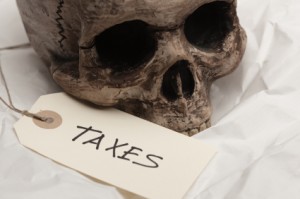 WASHINGTON, D.C. – One of the casualties of the imminent “fiscal cliff” will be the current estate tax rates. As things stand now, the federal government taxes estates worth $5 million dollars and up to 35 percent. If the Bush-era tax rates are allowed to expire in January, rates will increase to 55 percent on estates of $1 million or more.
WASHINGTON, D.C. – One of the casualties of the imminent “fiscal cliff” will be the current estate tax rates. As things stand now, the federal government taxes estates worth $5 million dollars and up to 35 percent. If the Bush-era tax rates are allowed to expire in January, rates will increase to 55 percent on estates of $1 million or more.
Some Republicans want to eliminate the death tax entirely but President Obama has proposed a 45 percent rate on estates of $3.5 million and up. According to the American Farm Bureau, up to 97 percent of American farms and ranches will be subject to an estate tax where the exemption is set at $1 million. At that rate, the federal government will garner $40 billion in 2013 and up to $86 billion in 2021, an increase from just $12 billion this year.
Patrick Lester, director of Federal Fiscal Policy with the progressive think tank, OMB Watch, defended the coming rise in estate tax rates saying: “The idea behind the estate tax is to prevent the very wealthy among us from accumulating vast fortunes that they can pass along to the next generation. The poster child for the estate tax is Paris Hilton — the celebrity and hotel heiress. That’s who this is targeted at, not ordinary Americans.”
But rancher Kevin Kester of the Bear Valley Ranch in Central California disagrees. The rancher who works 12 hour days, drives a 12-year-old pick-up truck, and earns less than a typical Washington bureaucrat will be hit hard by the so called “death tax.” Twenty years ago, Kester paid the IRS $2 million when he inherited a 22,000-acre cattle ranch from his grandfather.
This coming January, the tax burden on Lester’s children will be more than $13 million. “There is no way financially my kids can pay what the IRS is going to demand from them nine months after death and keep this ranch intact for their generation and future generations,” he said.
Many Democrats contend the tax promotes equality among classes, especially in capital gains — or stocks passed from one generation to another. Since stocks are only taxed when they are sold, the government can’t profit from long-term investments without the estate tax.
To supporters of a high estate tax, Kester is the kind of person they rarely mention. He doesn’t own a mansion. He’s not the CEO of a multi-national. But because of his line of work, he owns a lot of property that would be subject to a lot of tax.
“Our number one goal is to repeal the estate tax, to get rid of it, not have it for every generation, when I die and my kids die and so on,” said Kester. “For everyone to have to re-purchase the ranch or farm over and over for each generation, that’s inherently unjust. So what we’re doing is asking our politicians to understand that and repeal the estate tax.”
A majority of Republicans argue that, because the estate tax falls on assets, it hampers investment by reducing incentives to save and invest. A pending estate tax can become a disincentive to invest in an otherwise viable business, forcing older people to liquidate or shift resources out of an ongoing business and into a trust or tax-free investment.
“We’re not millionaires in the terms of making a million dollars a year,” said Kester who lives in a modest home and whose family runs his ranch. “I have a half-a-million dollars in soil.” Kester can’t spend it, without selling land. But by selling the land, each year the ranch would become less viable.
The estate tax dates back to 1916 when then-President Woodrow Wilson imposed the tax of 1 to 10 percent on the wealthy because World War I reduced federal government revenues. Under Franklin Delano Roosevelt, the tax rose to 77 percent, as Congress tried to prevent wealth from becoming concentrated among a few powerful and super-rich families.
 Off The Grid News Better Ideas For Off The Grid Living
Off The Grid News Better Ideas For Off The Grid Living



